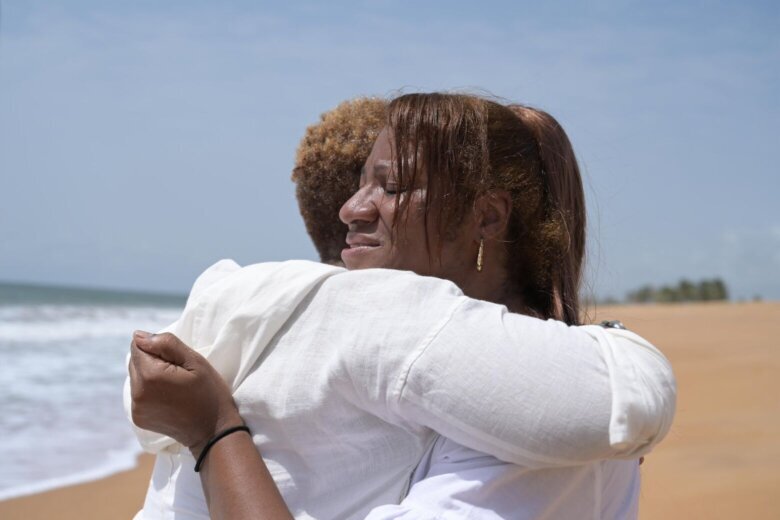Just in time for Juneteenth, a new documentary highlights an untold story of African-American history.

The National Geographic documentary “Clotilda: The Return Home” premieres on Disney+ and Hulu on Monday, June 17. It chronicles a full-circle journey for the descendants of the last known American slave ship, the Clotilda, which infamously brought 110 African slaves to Mobile, Alabama, in 1860.
“In 1808, the slave trade had been made illegal, so nobody was supposed to be bringing ships across the Atlantic,” Nat Geo Explorer Tara Roberts told WTOP. “A gentleman in Alabama who was a plantation owner and shipbuilder got word that one of the kings in Benin, the king of the Dahomey, was selling captive Africans, so he made a bet that he could build a ship and sail illegally over to Benin, buy Africans and bring them back without being caught.”
To cover up his tracks, the shipbuilder unloaded the slaves, burned the vessel and sank it in the Mobile River.
“The people on the ship survived … people actually remember being captured and they passed those stories down to their descendants,” Roberts said. “They were freed in 1865 during the Civil War. They decided to pool their earnings together (and) started working as sharecroppers. There were 32 of them, it took them nine years and they managed to save up $300, bought 57 acres of land and turned that into a community called Africatown.”
Legend grew about the ship’s whereabouts, only for the wreckage to finally be discovered in 2019.
“It’s the only slave shipwreck that’s been found relatively intact,” Roberts said. “Most of these ships are splinters on the ocean floor because they were made out of wood 200 or 300 years ago, so when they wrecked, the ocean reclaimed them. But with the Clotilda, because they sank it in the Mobile River, which is a very muddy river, the mud preserved the wreck, so it is a scientific marvel that everybody is super excited about.”
While the Netflix documentary “Descendant” (2022) explored the lives of the descendants in Alabama, Nat Geo’s “Clotilda: The Return Home” shows these relatives traveling back to their ancestral home of Benin, Africa.
“It does feel like to get the full story, it’s great to watch them both,” Roberts said. “The ‘Descendant’ story focuses on what’s happening in the community there in Africatown. But ‘Clotilda: The Return Home’ is about the descendants, specifically of Cudjoe Lewis and Gumpa Lee, who were two of the Africans on the Clotilda, and it’s about their descendants actually tracing the route that they took to come to the Americas.”
Tracing the exact route was a historical challenge, considering that 1.8 million slaves died crossing the Atlantic Ocean in the Middle Passage, alone, not to mention the countless deaths that occurred during slavery in the U.S.
“Cudjo Lewis actually drew a map back in 1860 that detailed his route from his village in the north of Benin, all the way to the U.S.,” Roberts said. “He drew that map and then gave it to his descendants who passed it down from generation to generation — and we followed that route home, and it was amazing.”
The Nat Geo cameras capture the raw emotions of the American descendants as they greet the people of Benin.
“They didn’t take the remains, but they took soil from the grave sites of their ancestors, Cudjoe Lewis and Gumpa Lee,” Roberts said. “The descendants of Cudjoe Lewis — Garry, Altevese and Cassandra — said their ancestor, Cudjoe, always said that he wanted to go home. Always. This was 150 years ago that he said, ‘I want to go back home,’ and he was never able to do it, so for them fulfilling that dream of their ancestor just meant everything.”
Roberts accompanied them on their journey, at one point saying, “I’m crying and it’s not even my story,” to which one of the descendants says, “It is your story,” acknowledging a shared universal truth for African Americans.
“What made it so special for me is that most African Americans cannot trace their ancestry back to a specific place in Africa,” Roberts said. “There’s this thing that genealogists call the ‘1870s Brick Wall’ (because) before 1870, the U.S. Census did not trace identifying details of enslaved people. So most of us get stuck in the mid-1800s, but to be able to actually trace back to a specific village in Africa is astounding.”
Listen to our full conversation here.
Get breaking news and daily headlines delivered to your email inbox by signing up here.
© 2024 WTOP. All Rights Reserved. This website is not intended for users located within the European Economic Area.








